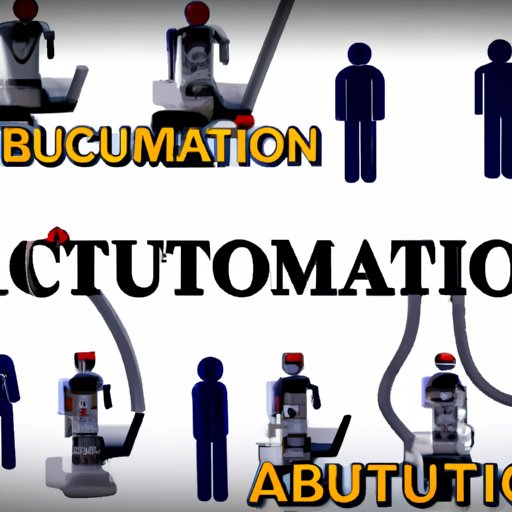Introduction
Automation is one of the biggest trends in the modern business landscape, with many companies turning to automated systems to help them increase efficiency and reduce costs. Automation can be used to automate a wide range of tasks, from customer service and data entry to manufacturing and logistics. However, while automation can bring significant benefits to businesses, it also has the potential to disrupt existing employment models and cause major changes to the way people work. This article will explore how automation will affect employment and productivity in the future.

Examining the Benefits of Automation
Automation offers a number of potential benefits to businesses, including increased efficiency and productivity, improved quality of products and services, and cost savings. Automated systems can help businesses streamline processes by eliminating manual tasks and reducing errors, saving time and money. Automation can also enable businesses to produce higher quality goods and services, as automated systems are more reliable than humans and can often provide more accurate results. Additionally, automation can save businesses money by reducing labor costs, as automated systems require fewer employees to operate them.

Exploring the Impact of Automation on Businesses and their Workforce
The introduction of automation into the workplace is likely to have a significant impact on businesses and their workforce. Automation has the potential to both create and eliminate jobs, as some tasks may become automated, while new types of jobs may emerge due to the introduction of new technologies. Automation may also change the nature of work, as many of the tasks that were once performed by humans may now be done by machines. Furthermore, automation could lead to changes in the skillsets required for certain jobs, as machines are better suited to performing repetitive tasks than humans are.
How Automation Will Change the Nature of Work in the Future
In the future, automation is likely to have a major impact on the nature of work. Automation has the potential to increase productivity and efficiency, as automated systems can complete tasks faster and more accurately than humans. Additionally, automation could lead to the emergence of new types of jobs as businesses find new ways to utilize automated systems. However, there are also challenges associated with implementing automation, such as the need to invest in new technologies and training employees to use them.
Conclusion
Automation is already having a significant impact on the modern workplace, and this trend is likely to continue in the future. Automation has the potential to bring numerous benefits to businesses, including increased efficiency and cost savings. However, it also has the potential to disrupt existing employment models, changing the nature of work and requiring new skillsets for certain jobs. Ultimately, businesses should consider the potential benefits and challenges of automation before investing in automated systems.
Final Thoughts
As automation continues to become more prevalent in the workplace, businesses must prepare themselves for the potential changes it may bring. Automation has the potential to bring many benefits to businesses, but it also has the potential to disrupt existing employment models and cause major changes to the way people work. As such, businesses should consider the potential impacts of automation before investing in automated systems.
(Note: Is this article not meeting your expectations? Do you have knowledge or insights to share? Unlock new opportunities and expand your reach by joining our authors team. Click Registration to join us and share your expertise with our readers.)
